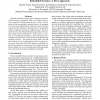Free Online Productivity Tools
i2Speak
i2Symbol
i2OCR
iTex2Img
iWeb2Print
iWeb2Shot
i2Type
iPdf2Split
iPdf2Merge
i2Bopomofo
i2Arabic
i2Style
i2Image
i2PDF
iLatex2Rtf
Sci2ools
131
click to vote
ESTIMEDIA
2005
Springer
2005
Springer
Scratchpad Sharing Strategies for Multiprocess Embedded Systems: A First Approach
Portable embedded systems require diligence in managing their energy consumption. Thus, power efficient processors coupled with onchip memories (e.g. caches, scratchpads) are the base of today’s portable devices. Scratchpads are more energy efficient than caches but require software support for their utilization. Portable devices’ applications consist of multiple processes for different tasks. However, all the previous scratchpad allocation approaches only consider single process applications. In this paper, we propose a set of optimal strategies to reduce the energy consumption of applications by sharing the scratchpad among multiple processes. The strategies assign both code and data elements to the scratchpad and result in average total energy reductions of 9%-20% against a published single process approach. Furthermore, the strategies generate Pareto-optimal curves for the applications allowing design time exploration of energy/scratchpad size tradeoffs.
| Added | 27 Jun 2010 |
| Updated | 27 Jun 2010 |
| Type | Conference |
| Year | 2005 |
| Where | ESTIMEDIA |
| Authors | Manish Verma, Klaus Petzold, Lars Wehmeyer, Heiko Falk, Peter Marwedel |
Comments (0)

